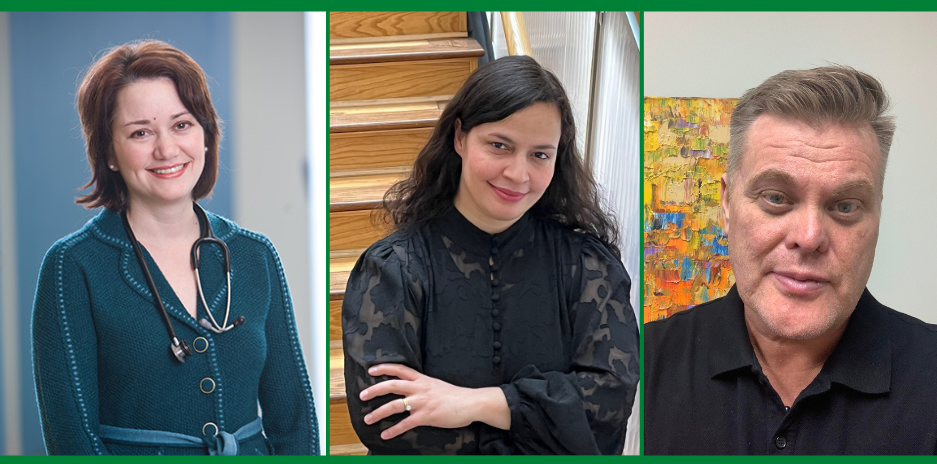Better Indigenous health-care education through collaboration
18 January 2023

Researchers Forgie, Rashid and Clark
Addressing the need for better health care for First Nations, Inuit and Métis people in Canada is a theme woven throughout the Truth and Reconciliation Commission (TRC) of Canada’s 94 Calls to Action Document. Specifically, item No. 23 calls upon the government to provide cultural competency training for all health-care professionals.
Marghalara Rashid, a qualitative educational researcher working in the Department of Pediatrics, believes appropriate Indigenous education for resident physicians is key to achieving this. She has designed a qualitative research study to determine the knowledge, skills and experiences needed for residents in any subspeciality to provide the best possible care when working with rural Indigenous communities.
With support and guidance from Wayne Clark, executive director of the Faculty of Medicine & Dentistry’s Wâpanachakos (Indigenous Health Program), Department of Pediatrics chair Sarah Forgie, and Indigenous Elders, Rashid has embarked on a collaborative, multi-site research project that will bring together medical educators and Elders from Indigenous communities, and representatives from medical schools at the universities of Alberta, Calgary and Manitoba.
The community-engagement focus of this research is exciting for Clark, because residency education programs designed in consultation with First Nations are a rarity. “We currently offer Indigenous health education in medical school, but when I heard about expanding Indigenous education in residency programs, I was really excited,” says Clark. “Actually getting feedback and input from the community itself on what they want health education to ential could really expand what training opportunities look like.”
The study began with Rashid doing a literature review of similar work that has taken place both in and outside of Canada. It was not surprising that the review revealed a historical lack of involvement on the part of Indigenous people, and that solidified her intention to ensure Indigenous people are consulted throughout her process. “I think it's significant to have the Indigenous perspective on the study from start to end, which is why most of my collaborators have an Indigenous background or have expertise in Indigenous scholarship,” explains Rashid.
The community partners include practitioners working in Indigenous health communities or with Indigenous health expertise, and community Elders. Rashid will meet with members of these communities to collect information about health needs and cultural practices, to identify gaps in knowledge in current postgraduate curricula.
Following this, 15 participants from each site will be selected based on expertise and experience to review the information collected using the Delphi consultation method, a consensus-building research technique. The results of the consultation will then be used to identify actionable recommendations to be implemented in residency programs.
This work can be complex and time consuming, but the approach will help ensure the recommendations that emerge out of the study come from the communities, not just researchers or medical schools. “We need to keep in mind that it is about what these communities need from us as health professionals and educational scientists, rather than what we need from them,” Rashid explains. This unique process will also help leadership of the participating medical schools develop culturally sensitive and appropriate curricula, Forgie adds. “As Wayne (Clark) said, we can't decide what their needs are. So we need to listen, look and learn, and work together to address those needs.”
The team won’t be seeking ideas about specific activities to implement. Rather, they’re looking for universal themes and findings generated from evidence based educational data that can be transferred between training in all subspeciality programs in the participating schools and hopefully additional medical schools in future. As an example, Clark notes Jordan’s Principle, a child-first principle intended to support First Nation children receiving any public service made available to other Canadian children. “Jordan’s Principle is important. We need to train the physicians to understand why it’s necessary in the first place. And that starts with education,” he says.
“In the end, we want to produce educational recommendations for residency programs to optimize Indigenous health. And the educational experiences of our learners — specifically residents — so they can provide that culturally sensitive care. That’s the target,” says Forgie.